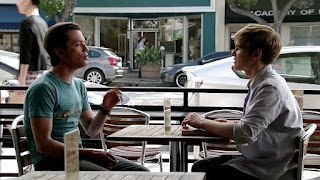 Rusty Beck and Gus Wallace from Major Crimes would fit perfectly into a yaoi manga!
Rusty Beck and Gus Wallace from Major Crimes would fit perfectly into a yaoi manga!The characters' relationship is well-written. My analysis will concentrate on Season 4 since I haven't yet begun Season 5 (I wait until seasons come out on DVD; I like the satisfaction of watching multiple episodes at a time on my television as opposed to online). In particular, I will compare Rusty-TJ's relationship to Rusty-Gus's relationship (my analysis of Rusty Beck alone can be found on my main blog).
I mentioned in an earlier post that one of the common tropes in romances (paperback and manga, shojo and yaoi) is the triangle. The interfering third party is sometimes villainous--it's so much easier to hate the interferer than to pity him or her!--but manga surprisingly often presents the third party as misguided rather than bad. (Even in Mars, the psychotic dead brother's ex-girlfriend is ultimately saved rather than rejected; likewise, "bad girls" in manga--Library Wars, Dengeki Daisy--are usually befriended by the heroine rather than punished for being such awful brats. Okay, sometimes, they are punished first.)
Likewise, the "ex" in manga is often treated quite kindly--he or she honestly doesn't deserve to get dumped. But getting dumped is part of life, so, well, there ya go. Said "ex"es are often allowed to love again and will usually get their own volumes in which they will finally find love!
 |
| Irritated TJ ticking off Rusty |
On the other hand, TJ's misreading of his relationship with Rusty is symptomatic of the kind of relationship pits that Rusty consistently falls into--and needs to learn to avoid. This doesn't make TJ bad; it simply means both members of the couple need to move on.
Rusty is extremely bright and innately empathetic. He has learned the hard way to not allow himself to be used, specifically not to become an enabler. Yet he has a bad tendency of embroiling himself with people who then try to push him into taking on their perspectives and sometimes their problems.
Rusty meets TJ while searching for Mariana/Alice's identity. He perceives TJ first and foremost as an acquaintance, someone who is willing to help with the investigation. TJ's lack of honesty with his own family places him--in Rusty's mind--on the list of people that Rusty knows, not necessarily the list of people he closely befriends.
 |
| Differentiating and circumscribing can revolve back into |
| bonding and integrating or dissolve into stagnation. |
This miscommunication is a classic example of one member of a relationship being at the initiation stage of relationship while another member thinks they are at the bonding stage.
Despite his youthful appearance--and his aloofness that can be misread as indecision--Rusty always acts based on his own mental process, not someone else's.
 |
| Sharon's Advice: "Be kind and be safe." Sounds easy except |
| she really means it! And true kindness isn't always easy. |
Gus also handles Rusty well, though quite differently from everyone else. One, he demonstrates incredible patience with Rusty. Although the audience and Rusty meet Gus when Gus is upset, his behavior even under duress demonstrates that he is a "sit back and let people be" type of guy. (Rusty is the high-maintenance member of the relationship.) Two, Gus is willing to brainstorm ways to solve problems alongside Rusty--rather than take up the lecturer's role.
"It's not just how much you love someone," says William Hurt's character in Accidental Tourist. "Maybe what matters is who you are when you're with them." There is a great deal of truth to this quote. In particular, it puts paid to the ridiculous notion that *any* relationship can work as long as the significant others are "good" people.
From a writing perspective, understanding that "good" people can still not work provides potentially interesting conflict. Writing relationships based on personality, rather than niceness, is never easy--but it is worth the effort.